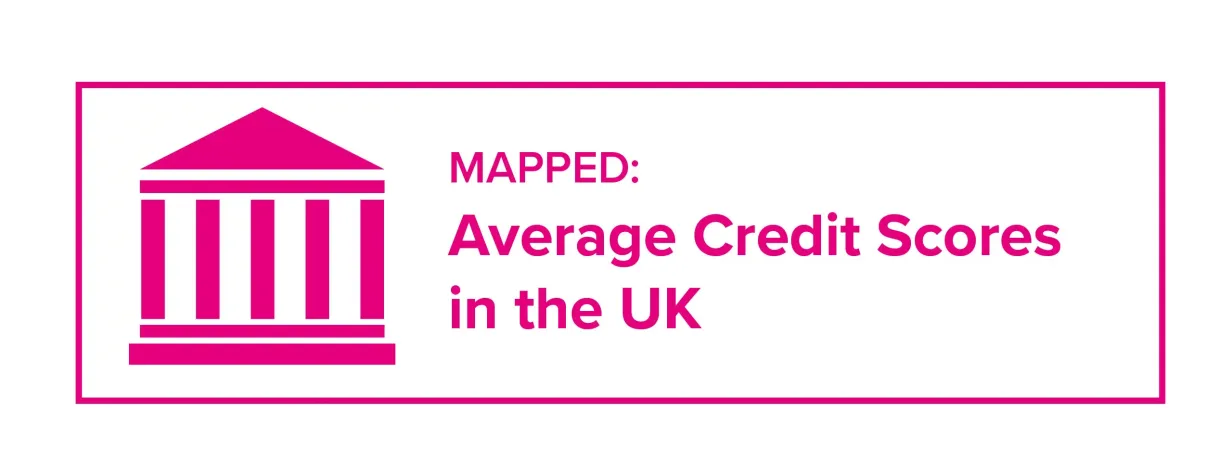Mapped: Average Credit Scores in the UK

Credit scores impact so many aspects of our finances, including credit limits, interest rates and mortgage applications.
Average credit scores in the UK vary dramatically across regions, reaching as high as 861 in some areas, and down to 752 in others.
To find out where has the highest and lowest credit scores, we used Experian’s regional data to rank over 30 UK counties by their average credit score.
Surrey and Oxfordshire Boast the Highest Credit Scores in the UK
Surrey has the highest average credit score in the country, 102 points higher than the national average of 759 and 109 points higher than the average in Durham, the area with the lowest credit scores in the UK.
Top Ten: Best Credit Scores in the Country
| Highest Credit Score Areas | Total Score out of 999 | |
| 1 | Surrey | 861 |
| 2 | Oxfordshire | 842 |
| 3 | Berkshire | 838 |
| 4 | Hertfordshire | 833 |
| 5 | Rutland | 832 |
| 6 | West Sussex | 827 |
| 7 | Gloucestershire | 827 |
| 8 | Buckinghamshire | 827 |
| 9 | Somerset | 823 |
| 10 | Leicestershire | 822 |
On a regional level, these findings also show that London and the South East have the highest average credit scores overall in 2022:
| Rank | Region | Average credit score |
| 1 | South East | 831 |
| 2 | London | 818 |
| 3 | South West | 816 |
| 4 | East of England | 815 |
| 5 | East Midlands | 806 |
| 6 | West Midlands | 797 |
| 7 | North West | 780 |
| 8 | Yorkshire and the Humber | 780 |
| 9 | Wales | 768 |
| 10 | North East | 765 |
How has COVID-19 Impacted Credit Scores?
The last few years have been some of the most challenging and uncertain for people across the UK. Payment holidays were introduced to help borrowers struggling to keep up with their credit payments during the height of the pandemic, but these only lasted until November 2020, and since then the effects of the pandemic have led to a maintained interest in taking out loans.
According to Google search data, interest around loans peaked in March 2021, with the phrase ‘can I get a loan’ rising by 15% compared to the same period in 2020, while the phrase ‘how to improve credit score’ has grown almost 35% over the past 5 years.
How has the Cost of Living Crisis affected Credit Scores?
The global gas price crisis over the past year, leading to an energy price cap increase of 54% in April 2022, has caused significant anxiety for households trying to maintain a good credit score.
The cost of living crisis has caused people to experience a real-terms salary decrease of 2%, and as a result 2.5 million households missed a bill payment in January 2022, 800,000 more than in January 2021.
Unsurprisingly, loan collections have risen by 7% since December 2021. With more lending comes increased pressure on credit scores and households across the UK will be conscious that now is a time to be diligent with loan repayments.
Encouragingly, recent TransUnion research reports that since 2019 the number of UK adults who check their credit score at least once a month has risen by 30%. Although this is a sign that things are getting harder, it’s a positive sign that people are showing a greater awareness of their credit score amidst the cost of living crisis.
How To Boost Your Credit Score
Wondering how to improve your credit score? Several factors can positively impact credit scores throughout our lives. Registering to vote is an excellent place to start, as most credit scoring companies use the electoral roll to help confirm your identity and address. Three key ways to impact your score positively include:
- Set up direct debits where possible: Consistent, regular payments look good on your profile, so try to set up direct debits for as many payments as you can to ensure you pay on time and in full regularly.
- Maintain older accounts: The average age of your bank account is taken into consideration by credit scorers, so try to stick to one account that can be well managed over the long-term.
- Don’t borrow more than you can afford: Always ensure you can meet minimum repayments easily, and pay off accounts sooner if you can. This shows you can manage within your set limits.
It’s also worth noting that new trends, such as buy now, pay later schemes like Klarna, won’t harm credit scores unless payments are missed. These schemes typically perform a ‘soft search’ on your credit history, which means that no matter how many of these have been carried out, companies won’t be able to see them. This is opposed to the ‘hard’ checks performed when applying for a mortgage or a credit card, as these are always noted on your record.
What Impacts a Credit Score Negatively?
Credit scorers look for certain red flags when assessing your eligibility. Here are a few things you should try to avoid:
- Missing payments: If this happens regularly, you could have a potential default flagged on your profile which can stick around for up to six years.
- Lending beyond your means: Borrowing more than you can afford means sticking with repayments is tricky, and when debt piles up, it can quickly become unmanageable. If you get a debt relief order or apply for bankruptcy, your credit score will be significantly impacted.
- Regularly applying for credit: Each time you apply for credit, lenders perform a ‘hard’ search on your credit history which is logged on your profile. If too many of these are logged, it could potentially become a red flag.
Buying a Home through Shared Ownership
For buyers who can’t quite afford to purchase a home on the open market, Shared Ownership offers an alternative route onto the property ladder. The scheme allows purchasers to buy a share of a new build or resale home, usually between 25-75%, paying a mortgage on the share they own and a below-market-value rent on the remainder.
Credit Score FAQs: Buying a House through Shared Ownership
Q: What is considered a good credit score when trying to buy a home?
A: This isn’t an easy question to answer as there are many variables that play a part, plus different credit score companies all calculate scores differently. However, lenders don’t just take that figure into consideration; they look at several factors when scoring you, one of which is your credit score value. Therefore, even if your credit score isn’t quite where you’d like it to be, this shouldn’t be a deterrent.
Q: I can afford the home but have a poor credit history because of a past instance. Can I still buy?
A: While poor credit history doesn’t rule out the possibility of buying a home, it can limit the number of mortgage lenders who are willing to accept your application, and you may incur higher interest rates. To be eligible to buy a home, you need to be able to take out a mortgage and if your credit history stops you from doing this, then you would not be able to proceed.
We would recommend speaking to an independent financial advisor who can assess your situation and outline your budget to help you in your search for a home. Credit score is taken into consideration, and you’ll get a better understanding of this during your assessment. Try our mortgage calculator to get an idea of affordability.
Q: I have loans, a credit card and overdraft. Will I still be eligible for Shared Ownership or Help to Buy?
A: This depends on the size of the loans and credit cards as they are taken into consideration when working out affordability, although it will not completely rule you out. For further information, we recommend speaking with a financial adviser to discuss the options available to you.
Q: I’ve been assessed and approved for a Shared Ownership home but I am being asked for a 10% deposit, rather than the 5% I was expecting. Why is this the case?
A: This depends on your individual circumstances – for example, if you’re in temporary work, have visa restrictions, have a lot of financial commitments or have a poor credit history.
The deposit for a Shared Ownership property is often 5-10% of the share that you’re purchasing, however in some instances a larger amount can improve the likelihood of being accepted for a mortgage, while some lenders may see a bigger deposit as proof to the financial commitment. If you’re looking to buy a home, we suggest speaking with an independent mortgage advisor who can recommend the best mortgage rates and options to suit your budget.
Q: Are there any examples of why a lender would reject a mortgage application?
A: Various criteria are taken into consideration when applying for a mortgage – in turn, there’s a number of reasons why you might be rejected. It is your mortgage adviser’s job to look into your situation in enough detail to ensure that they place you with a lender who will accept your application.
Any unusual factors in your situation most likely reduces the number of lenders that would accept your application, which may mean that you don’t have access to the very best rates available, but your adviser will let you know if this is the case. However, no matter how well the adviser has done their job, the most common stage that a lender will decline is once the credit score check has been completed.
Method:
*We sourced average credit score data from Experian for UK local councils. We compiled scores for each council into counties and then calculated averages for each county. Experian scores are out of 999 with an average UK credit score of 759.
Please Note: All data is correct at time of publication. This is not financial advice nor a reflection of your ability to apply for credit. Please contact your preferred credit reference agency for a detailed representation of your individual score.

